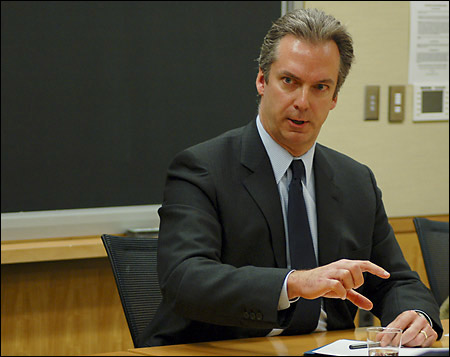U.S. pushes for regime change in Burma
John calls for release of political prisoners, beginning of democratic process
A U.S. State Department official reiterated the Bush administration’s support for continued economic sanctions on Burma Friday (Feb. 17) as part of a multipronged effort to convince the repressive military regime to embrace democratic reforms.
In addition to sanctions, the United States is working with Burma’s neighbors and nations that have close ties with the country in hopes that international pressure will bear results that have so far been elusive.
Eric John, deputy assistant secretary of state for the Bureau of East Asian and Pacific Affairs, described the United States’ Burma policy during a lunchtime talk at the Center for Government and International Studies. The talk, part of the Asia Center’s Modern Asia Series, was moderated by Thomas Vallely, director of the Vietnam Program at the John F. Kennedy School of Government’s Center for Business and Government.
John said that U.S. concerns about Burma have been heightened recently with the re-establishment of diplomatic relations between Burma and North Korea. The authoritarian regimes have isolated themselves to the point where they were almost driven into each other’s arms, John said. The potential transfer of technology from North Korea, which has developed nuclear weapons, to Burma heightens the administration’s concern.

“As they isolated themselves from the rest of Asia and the world,” John said, “they were almost pointed to each other.”
Burma, which the current military regime renamed Myanmar in 1989, was once one of the most promising nations in Southeast Asia, John said. After World War II, it was the world’s leading rice exporter, with a strong economy, high enrollment in primary and secondary schools, and an elected government. U Thant, a Burmese official, served as United Nations secretary-general from 1961 to 1972.
In recent decades, however, military rulers have isolated the nation under harsh rule.
“The current regime has taken the country in a tragically different direction,” John said.
Burma’s current leaders have presided over an enormous economic decline and steadily worsening human rights situation, John said. The government has promoted a political process within which the opposition is banned. The nation has an estimated 1,100 political prisoners, including opposition leader and Nobel Peace Prize winner Aung San Suu Kyi, who has been under house arrest since 2003.
Among the United States’ concerns are internal Burmese ills that overflow into neighboring countries, such as drug trafficking, refugees, and forced labor.
The United Nations has adopted 28 resolutions concerning Burma, all of which have been rejected by the nation.
John said there seems to have been a recent shift in international opinion in the direction of increasing pressure on Burma to move toward free elections, such as those that took place in 1990 but whose results were never implemented.
The Bush administration’s approach seeks to maintain economic pressure through sanctions, though John admitted the sanctions’ biggest effect may be a moral one for the internal Burmese opposition. He said the United States is also working with India, Japan, China, and other Southeast Asian nations to emphasize that they can have a constructive role.
“All of us have an interest in seeing change in Burma,” John said.
The administration is calling for a release of all political prisoners, the beginning of a credible, democratic political process, access to the country by United Nation’s representatives, and permission for assistance organizations to help Burma’s needy.
Though there is the possibility of an abrupt collapse of the Burmese government, John said he didn’t think that was likely, or even preferable, since it would throw the nation into turmoil. Rather, a more gradual transition, perhaps even with the current military government staying in place during the transition, would be preferable.
The administration is contributing financially to help the Burmese people by sending aid to nongovernment organizations working within Burma on AIDS and other relief.
“The road ahead is not short,” John said. “As President Bush said, ‘The Burmese people want their liberty and one day they will have it.’”




